Fleurs du Mal Magazine


Or see the index

John Jarmain
(1911 – 1944)
El Alamein
There are flowers now, they say, at Alamein;
Yes, flowers in the minefields now.
So those that come to view that vacant scene,
Where death remains and agony has been
Will find the lilies grow –
Flowers, and nothing that we know.
So they rang the bells for us and Alamein,
Bells which we could not hear:
And to those that heard the bells what could it mean,
That name of loss and pride, El Alamein?
– Not the murk and harm of war,
But their hope, their own warm prayer.
It will become a staid historic name,
That crazy sea of sand!
Like Troy or Agincourt its single fame
Will be the garland for our brow, our claim,
On us a fleck of glory to the end:
And there our dead will keep their holy ground.
But this is not the place that we recall,
The crowded desert crossed with foaming tracks,
The one blotched building, lacking half a wall,
The grey-faced men, sand powdered over all;
The tanks, the guns, the trucks,
The black, dark-smoking wrecks.
So be it: none but us has known that land:
El Alamein will still be only ours
And those ten days of chaos in the sand.
Others will come who cannot understand,
Will halt beside the rusty minefield wires
And find there – flowers.
Mareth, Tunisia. March, 1943
John Jarmain poetry
fleursdumal.nl magazine
More in: Archive I-J, Jarmain, John
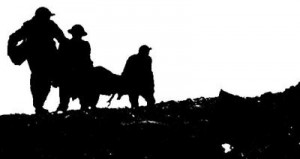
Georg Trakl
(1887 – 1914)
Grodek
Am Abend tönen die herbstlichen Wälder
Von tödlichen Waffen, die goldnen Ebenen
Und blauen Seen, darüber die Sonne
Düster hinrollt; umfängt die Nacht
Sterbende Krieger, die wilde Klage
Ihrer zerbrochenen Münder.
Doch stille sammelt im Weidengrund
Rotes Gewölk, darin ein zürnender Gott wohnt,
Das vergossne Blut sich, mondne Kühle;
Alle Straßen münden in schwarze Verwesung.
Unter goldnem Gezweig der Nacht und Sternen
Es schwankt der Schwester Schatten durch den schweigenden Hain,
Zu grüßen die Geister der Helden, die blutenden Häupter;
Und leise tönen im Rohr die dunkeln Flöten des Herbstes.
O stolzere Trauer! ihr ehernen Altäre,
Die heiße Flamme des Geistes nährt heute ein gewaltiger Schmerz,
Die ungebornen Enkel.
Georg Trakl poetry
fleursdumal.nl magazine
More in: Archive S-T, Trakl, Georg, Trakl, Georg
Julian Grenfell
(1888 – 1915)
INTO BATTLE
The naked earth is warm with spring,
And with green grass and bursting trees
Leans to the sun’s gaze glorying,
And quivers in the sunny breeze;
And life is colour and warmth and light,
And a striving evermore for these;
And he is dead who will not fight;
And who dies fighting has increase.
The fighting man shall from the sun
Take warmth, and life from the glowing earth;
Speed with the light-foot winds to run,
And with the trees to newer birth;
And find, when fighting shall be done,
Great rest and fullness after dearth.
All the bright company of Heaven
Hold him in their high comradeship,
The Dog-Star, and the Sisters Seven,
Orion’s Belt and sworded hip.
The woodland trees that stand together,
They stand to him each one a friend;
They gently speak in the windy weather;
They guide to valley and ridge’s end.
The kestrel hovering by day,
And the little owls that call by night,
Bid him be swift and keen as they,
As keen of ear, as swift of sight.
The blackbird sings to him, ‘Brother, brother,
If this be the last song you shall sing,
Sing well, for you may not sing another;
Brother, sing.’
In dreary, doubtful, waiting hours,
Before the brazen frenzy starts,
The horses show him nobler powers;
O patient eyes, courageous hearts!
And when the burning moment breaks,
And all things else are out of mind,
And only Joy of Battle takes
Him by the throat, and makes him blind,
Through joy and blindness he shall know,
Not caring much to know, that still
Nor lead nor steel shall reach him, so
That it be not the Destined Will.
The thundering line of battle stands,
And in the air Death moan and sings;
But Day shall clasp him with strong hands,
And Night shall fold him in soft wings.
Julian Grenfell poetry
fleursdumal.nl magazine
More in: Archive G-H, Greenfel, Julian

Alun Lewis
(1915 – 1944)
ALL DAY IT HAS RAINED
All day it has rained, and we on the edge of the moors
Have sprawled in our bell-tents, moody and dull as boors,
Groundsheets and blankets spread on the muddy ground
And from the first grey wakening we have found
No refuge from the skirmishing fine rain
And the wind that made the canvas heave and flap
And the taut wet guy-ropes ravel out and snap,
All day the rain has glided, wave and mist and dream,
Drenching the gorse and heather, a gossamer stream
Too light to stir the acorns that suddenly
Snatched from their cups by the wild south-westerly
Pattered against the tent and our upturned dreaming faces.
And we stretched out, unbuttoning our braces,
Smoking a Woodbine, darning dirty socks,
Reading the Sunday papers – I saw a fox
And mentioned it in the note I scribbled home;
And we talked of girls and dropping bombs on Rome,
And thought of the quiet dead and the loud celebrities
Exhorting us to slaughter, and the herded refugees;
-Yet thought softly, morosely of them, and as indifferently
As of ourselves or those whom we
For years have loved, and will again
Tomorrow maybe love; but now it is the rain
Possesses us entirely, the twilight and the rain.
And I can remember nothing dearer or more to my heart
Than the children I watched in the woods on Saturday
Shaking down burning chestnuts for the schoolyard’s merry play
Or the shaggy patient dog who followed me
By Sheet and Steep and up the wooded scree
To the Shoulder o’ Mutton where Edward Thomas brooded long
On death and beauty – till a bullet stopped his song.
Alun Lewis poetry
fleursdumal.nl magazine
More in: Archive K-L, Lewis, Alun
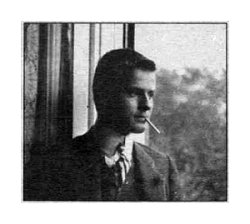
Hans Leybold
(1892-1914)
Traum der Sehnsucht
Wie oft hab ich meine Arme ausgebreitet
In der Nacht
Und hab gelegen
Und hab gewacht
Und hab gewartet auf dich …
Du musstest einmal kommen,
Und du kamst!
Du musstest kommen
Und du nahmst
All dies einsamgraue, öde Elend fort …
Du kamst wie ein Rosenhauch
In den Raum
Und knietest an meinem Bette –
Mir war’s wie ein Traum …
Und meine Arme schlossen sich
Sanft um deine gebeugte Gestalt.
Ich küsste Stirn dir und Haar,
Wieder und wieder … und mir war,
Als entzöge dich mir eine sanfte Gewalt …
Wo bliebst du … wo …?
Hart und roh
Schlägt mein Kopf an den Boden –!
Hans Leybold poetry
fleursdumal.nl magazine
More in: *War Poetry Archive, Archive K-L, Expressionism, Leybold, Hans

Hans Leybold
(1892-1914)
O über allen Wolkenfahnen ...
O über allen Wolkenfahnen,
die windgetrieben sich in Bläue krallen,
stehen unverrückbar Sonnen, welche niemals fallen.
wir schwingen uns bewegt in ihre Bahnen,
sind selber Nebel und bestrahlte Dämpfe.
Verdrängen wir die nächt’gen Schatten
der Erdendinge! Lassen alle nimmersatten
Begierden. Gelöst sind alle Krämpfe,
die hart die Glieder engten.
Wir werden Äther, Luft und Wellen.
Oh, aus unsern Leibern strömen Quellen,
spritzend in das ungewohnte Licht! Wir schenkten
uns dem All! Es hat uns königlich empfangen.
Mit Sturmtrompeten und mit Regenwehen.
Wie unsre Füße über Sonnenbrücken gehen!
In unsrer Hände Kelch hat sich ein Tropfen Gold gefangen.
Hans Leybold poetry
fleursdumal.nl magazine
More in: *War Poetry Archive, Archive K-L, Hans Leybold, Leybold, Hans

Hans Leybold
(1892-1914)
Auch ein Nekrolog
für Christian Morgenstern
O Christian, wir glätten weinend unsre Bügelfalten:
auf Feuerleitern krochen wir mit dir in rhythmische Gerüste.
Mit dem Zement der Ironie ausfülltest du die Spalten
vermorschter Traditionen Mauer. O metaphysisches Gelüste.
O Huhn und Bahnhofshalle! Weit entfernte Latten!
Ihr Wiesel, Kiesel, mitten mang det Bachjeriesel!
Palmström, du ohngeschneuzter, den sie kastrieret hatten!
Genosse Korf, du nie banaler Wennschon – Stiesel!
(Verzeiht den Kitschton. Mich übermannte hier die Rührung.
Verzeih besonders du, Kollege Untermstriche:
schon hab ich in der harten Hand der Verse Führung
wieder; und komme mir auf meine Schliche.) –
Nun quäkt der Turmhahn geil auf Staackmanns Miste
sein Kikriki, und ist bald Ernst, bald Otto.
Verleger reißen sich die Haare aus, als ob das müßte,
und spielen mit der Perioden-Presse trotzdem Lotto.
O Christian: wie später Gotik wandgeklatschter Freske
(im spitzen Reigen härmender sebastianischer Figuren):
du paßtest nicht in unsren Krämerkram, du fleischgewordene Groteske;
nicht schmiegte sich dein edler Vollbart in die Schöße unsrer Huren!
Das Literatenleben, o du mein Christian, ist doch nicht besser
als das ärarische. (Sie dichten zur Musik von Walter Kollo!)
Wir tanzen zwischen Film und Feuilleton auf scharfem Messer . . .
Freu dich! Sei tot! Grüß mir, im Glanz geölter Locken, den Apollo!
Hans Leybold poetry
fleursdumal.nl magazine
More in: *War Poetry Archive, Archive K-L, Hans Leybold, Leybold, Hans
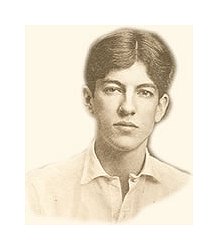
Alan Seeger
(1888-1916)
Vivien
Her eyes under their lashes were blue pools
Fringed round with lilies; her bright hair unfurled
Clothed her as sunshine clothes the summer world.
Her robes were gauzes–gold and green and gules,
All furry things flocked round her, from her hand
Nibbling their foods and fawning at her feet.
Two peacocks watched her where she made her seat
Beside a fountain in Broceliande.
Sometimes she sang. . . . Whoever heard forgot
Errand and aim, and knights at noontide here,
Riding from fabulous gestes beyond the seas,
Would follow, tranced, and seek . . . and find her not . . .
But wake that night, lost, by some woodland mere,
Powdered with stars and rimmed with silent trees.
Alan Seeger poetry
fleursdumal.nl magazine
More in: Archive S-T, Seeger, Alan
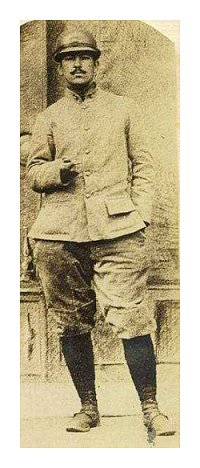
Alan Seeger
(1888-1916)
Do You Remember Once . . .
I
Do you remember once, in Paris of glad faces,
The night we wandered off under the third moon’s rays
And, leaving far behind bright streets and busy places,
Stood where the Seine flowed down between its quiet quais?
The city’s voice was hushed; the placid, lustrous waters
Mirrored the walls across where orange windows burned.
Out of the starry south provoking rumors brought us
Far promise of the spring already northward turned.
And breast drew near to breast, and round its soft desire
My arm uncertain stole and clung there unrepelled.
I thought that nevermore my heart would hover nigher
To the last flower of bliss that Nature’s garden held.
There, in your beauty’s sweet abandonment to pleasure,
The mute, half-open lips and tender, wondering eyes,
I saw embodied first smile back on me the treasure
Long sought across the seas and back of summer skies.
Dear face, when courted Death shall claim my limbs and find them
Laid in some desert place, alone or where the tides
Of war’s tumultuous waves on the wet sands behind them
Leave rifts of gasping life when their red flood subsides,
Out of the past’s remote delirious abysses
Shine forth once more as then you shone,–beloved head,
Laid back in ecstasy between our blinding kisses,
Transfigured with the bliss of being so coveted.
And my sick arms will part, and though hot fever sear it,
My mouth will curve again with the old, tender flame.
And darkness will come down, still finding in my spirit
The dream of your brief love, and on my lips your name.
II
You loved me on that moonlit night long since.
You were my queen and I the charming prince
Elected from a world of mortal men.
You loved me once. . . . What pity was it, then,
You loved not Love. . . . Deep in the emerald west,
Like a returning caravel caressed
By breezes that load all the ambient airs
With clinging fragrance of the bales it bears
From harbors where the caravans come down,
I see over the roof-tops of the town
The new moon back again, but shall not see
The joy that once it had in store for me,
Nor know again the voice upon the stair,
The little studio in the candle-glare,
And all that makes in word and touch and glance
The bliss of the first nights of a romance
When will to love and be beloved casts out
The want to question or the will to doubt.
You loved me once. . . . Under the western seas
The pale moon settles and the Pleiades.
The firelight sinks; outside the night-winds moan —
The hour advances, and I sleep alone.
III
Farewell, dear heart, enough of vain despairing!
If I have erred I plead but one excuse —
The jewel were a lesser joy in wearing
That cost a lesser agony to lose.
I had not bid for beautifuller hours
Had I not found the door so near unsealed,
Nor hoped, had you not filled my arms with flowers,
For that one flower that bloomed too far afield.
If I have wept, it was because, forsaken,
I felt perhaps more poignantly than some
The blank eternity from which we waken
And all the blank eternity to come.
And I betrayed how sweet a thing and tender
(In the regret with which my lip was curled)
Seemed in its tragic, momentary splendor
My transit through the beauty of the world.
Alan Seeger poetry
fleursdumal.nl magazine
More in: Archive S-T, Seeger, Alan, WAR & PEACE
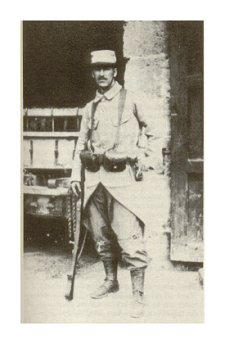
Alan Seeger
(1888-1916)
Resurgam
Exiled afar from youth and happy love,
If Death should ravish my fond spirit hence
I have no doubt but, like a homing dove,
It would return to its dear residence,
And through a thousand stars find out the road
Back into earthly flesh that was its loved abode.
Alan Seeger poetry
fleursdumal.nl magazine
More in: Archive S-T, Seeger, Alan

Hans Leybold
(1892-1914)
Konfusion – Ein Film
Plötzlich sprangen in den Straßen Gräber auf wie Erbsenschoten,
und jämmerliche Wesen wälzten sich heraus, die drohten
mit ihren blassgebleichten Knochen ihren Ururenkeln:
Die stoben fort und auseinander, als brennte es in ihren Schenkeln,
Pest oder Cholera im Bauch oder Jüngster Tag am Ende
(man muss doch sehn, ob man Rettung fände,
man hat sein kleines Leben lieb; die Hände,
die sich über alles strecken – –
wer weiß, ob man schlauer ist, versucht, sich zu verstecken).
Sie hopsen, springen ängstlich über Straßenbahngeleise
sie tanzen durcheinander: jeder in seiner Weise,
der eine verkriecht sich im Lokus, um sich zu retten,
der verwälzt sich tief in seine Betten,
viele fallen über die Geländer hoher Brücken,
fallen in hochgeschwollene Ströme, müssen in großen Schlücken
gelbes Wasser saufen, andere aber drücken
voll Furcht vor Unbekanntem sich an ihre Weiber.
Auf einmal greift eine unmäßig große Hand vom Himmel,
schiebt sich langsam durch chaotische Gewimmel,
plättet die Straßen als wären sie Wäsche,
greift aus dem Gewühl sich ein paar besonders fesche
Kokotten und Kavaliere, ein paar dicke Kommerzienräte,
stört in den diversen Salons die Abschiedsfete,
stürzt Börse und Kirche und Rathaus um, als mähte
sie Gras … hebt sich, verschwindet … nichts ist passiert.
Ein Gentleman sieht nach, außerordentlich blasiert.
Hans Leybold poetry
fleursdumal.nl magazine
More in: *War Poetry Archive, Archive K-L, Hans Leybold, Leybold, Hans

Alfred Lichtenstein
(1889-1914)
Der Athlet
Einer ging in zerrissenen Hausschuhen
Hin und her durch das kleine Zimmer,
Das er bewohnte.
Er sann über die Geschehnisse,
Von denen in dem Abendblatt berichtet war.
Und gähnte traurig, wie nur jemand gähnt,
Der viel und Seltsames gelesen hat –
Und der Gedanke überkam ihn plötzlich,
Wie wohl den Furchtsamen die Gänsehaut
Und wie das Aufstoßen den Übersättigten,
Wie Mutterwehen:
Das große Gähnen sei vielleicht ein Zeichen,
Ein Wink des Schicksals, sich zur Ruh zu legen.
Und der Gedanke ließ ihn nicht mehr los.
Und also fing er an, sich zu entkleiden …
Als er ganz nackt war, hantelte er etwas.
Alfred Lichtenstein poetry
fleursdumal.nl magazine
More in: *War Poetry Archive, Archive K-L, Expressionism, Lichtenstein, Alfred
Thank you for reading Fleurs du Mal - magazine for art & literature